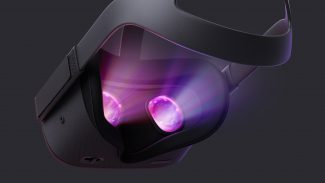Addressing shareholders during Facebook’s Q2 2019 earnings call last week, CEO Mark Zuckerberg said that unit sales of Oculus Quest are exceeding the available supply of the headset.
Facebook and Oculus have always been mum about sales figures for their VR headsets, but Zuckerberg confirmed what seemed apparent from the lack of Quest stock at major retailers since launch: supply is struggling to keep up with demand. The comments came during Facebook’s Q2 2019 earnings call last week where Zuckerberg highlighted the launch of Quest in his remarks to shareholders.
This quarter, we shipped Oculus Quest, our first all-in-one headset with no wires and full freedom of movement. It has gotten great reviews and we’re selling them as fast as we can make them. More importantly, we’ve delivered an experience that people keep using week after week, and buying more content.
Indeed, Quest has been difficult to find in stock in North America and Europe, from both Oculus and official retailers, for some two months since the headset’s launch. At times, the headset wasn’t expected to ship for at least a month from the order date.
Road to VR reached out to Oculus for comment on the situation, and while the company wouldn’t speak directly to the circumstances, an Oculus spokesperson said the company is working hard to make sure the headset is readily available.
“We’re thrilled with the reception to Quest and look forward to getting it into more people’s hands,” the spokesperson said.

The nature of the shortage is unclear, but three potential explanations seem most likely: Facebook underestimated demand, some factor outside of the company’s control (like a component shortage) is constraining manufacturing, or they chose to suffer an initial launch shortage in order to not ramp manufacturing beyond what would be necessary in the long-term. As far as we know, the Rift S shouldn’t be a factor because Oculus partnered with Lenovo to manufacture the headset.
Just within the last week or so, Quest stock appears to be returning to healthy levels, with the headset estimated to ship directly from Oculus to North America within three days, and to most European regions within one. Meanwhile, stock in the UK appears to be the most constrained currently, with the headset not expected to ship for a week after ordering. Facebook has refrained from offering any of its consumer VR headsets for sale in China.
– – — – –
During the earnings call, Zuckerberg further painted Quest as “superior in many ways” to the original Rift, while steering clear of directly mentioning the company’s latest PC VR headset, Rift S, which launched on the same day.
There’s still a lot of work ahead to develop this ecosystem and deliver the future of VR and AR products that we dream of, but [the launch of Quest] is an important milestone. In a few years, we’ve improved the state of the art from the original Rift, which cost $600 and needed to be tethered to a $1000 PC, to now Quest, which costs $400 all-in, and is a superior experience in many ways. There’s going to be even more innovation over the next few years, and we now have the platform we’re going to build on going forward.
He also took the opportunity to reaffirm his belief in Facebook’s long-term approach to AR and VR, assuring shareholders that the company has no intentions to abandon the tech despite the waning interest in a VR platform play from competitors like Google.
The reason augmented and virtual reality will deliver a qualitatively better experience than traditional computing platforms is that they deliver the feeling of presence—that you’re actually there with another person or in another place. The feeling of presence is so important to social interactions and how we’re wired to interact as people. So even if it has taken longer than we expected to deliver this at scale, I continue to believe that this will be one of the most important contributions we make to the way we all use technology over the long-term.
Following Zuckerberg’s comments, Facebook CFO David Wehner overviewed the company’s financial results for the second quarter, saying revenue in ‘Payments & Other Fees’ (which includes hardware products) was $262 million for the quarter (up 36%).
“This year-over-year growth was primarily driven by sales of new products, notably Oculus Quest and Rift S,” he added.
$262 million of course pales in comparison to the company’s tens of billions in quarterly advertising revenue, but it’s notable that sales of the headsets contributed meaningfully to ‘Payments & Other Fees’ revenue despite Quest and Rift S launching more than halfway through the quarter in question (not to mention stock shortages).
Facebook seems pretty happy with Quest’s momentum thus far, and the headset does seem to be making a strong impression in the broader tech landscape with reviewers on sites like CNET calling it “the best thing I’ve tried this year.” How will we know if Facebook is really happy with sales? If they eventually choose to share official Quest unit sales it would be the first time they ever did so for any of their five VR headsets.







